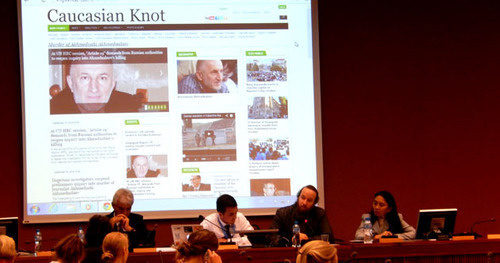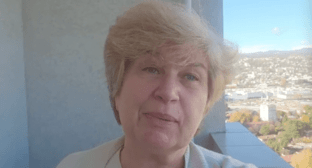
17 September 2014, 22:20
Human rights defenders and diplomats comdemn impunity in Akhmednabiev case
Participants of the discussion held on the sides of the UN Human Rights Council in Geneva have condemned the impunity for the murder of the ‘Caucasian Knot’ correspendent Akhmednabi Akhmednabiev and other journalists.
The discussion was organized by human rights defenders and organization ‘Article 19’. Today, the participants of the discussion have mentioned once more the need to reopen the investigation into the murder of Akhmedmabiev and called on Russian authorities to adopt resolution on the safety of journalists.
Akhmednabi Akhmednabiev worked as a ‘Causasian Knot’ correspondent more than seven years, covering hottest topics. In 2012 only, the news tape of the "Caucasian Knot" published 228 Akhmednabiev's materials; and since the start of 2013 – 92 materials. The "Caucasian Knot" is ready to pay 200,000 roubles reward for information on murder of Akhmednabi Akhmednabiev.
The ‘Caucasian Knot’ has reported that on September 16, in the course of the UN Human Rights Council session, activists of the international human rights organization "Article 19" demanded from Russian authorities to reopen the investigation into the murder of the "Caucasian Knot" reporter Akhmednabi Akhmednabiev. The 27th session of the UN Human Rights Council (HRC) is taking place in Geneva on September 9-26.
Today, the international human rights organization "Article 19" has held an event named ‘Ending impunity for attacks on journalists’ on the sides of the UN Human Rights Council. About 40 people attended the event, including Austria’s permanent representative to the UN, members of delegations of UK, Denmark, US, Canada, Brazil, Tunisia, Indonesia. OSCE represantative on freedom of the media Dunja Mijatović addressed the participants with a welcoming speech.
“New instruments are necessary at the international level in order to protect journalists. This can be achieved only if there are more loud voices coming from international organizations and enhanced cooperation between the different actors. Needless to say, achieving a proper level of protection and effectively fighting impunity also requires a strong political will”, said Dunja Mijatović in her welcoming speech.
Among speakers at the today’s event were Guy Berger, Director for Freedom of Expression and Media Development at UNESCO, Prima Quinsayas, prosecutor from Philippines who investigates murders of journalists, and Grigory Shvedov, Editor-in-Chief of the ‘Caucasian Knot’. In his speech the ‘Caucasion Knot’ Editor spoke about the cases of journalist Akhmednabi Akhmednabiev, Rauf Mirkadyrov and Marina Khachatryan. Following this speech represantative of NGO ‘Reporters Without Borders’ Hélène Sackstein initiated a discussion on how to attract attention to the crimes against media workers.
Akhmednabi Akhmednabiev, born in the village of Karata, Akhvakh District of Dagestan, was killed on July 9, 2013, in the outskirt of Makhachkala. On July 30, Russia’s investigators have suspended the preliminary investigation into the murder of jounalist. In Azerbaijan, Rauf Mirkadirov, a journalist who won the Gerd Bucerius Prizen, was detained on April 19 and put in custody on the charges of treason. In Armenia, Marina Khachatryan was attacked during the protest action in Yerevan.
In total 430 journalists were killed in the world in 2008-2012, said Director for Freedom of Expression and Media Development at UNESCO in his speech at the event. “Safety of journalists is not an issue of journalists, it’s an issue of freedom of information and freedom of fear in the society’, Guy Berger stated.
Following the discussion Prima Quinsayas, a prosecutor from Philippines, spoke about her personal experience in investigating the cases of voilence against journalists in her country.
‘In Philippines system of criminal justice allows private prosecutors to play a major role in investigations of crimes against journalists’, the ‘Caucasian Knot’ was told by Prima Quinsayas who had investigated 32 cases of violence against journalists.
Prior to the discussion the human rights organization "Article 19" posted in its website a film "Journalists at gunpoint " where issues of impunity and harassment of journalists, as well as new forms of pressure on independent media, including in North Caucasus, are described. One of the parts of the film is named "Dagestan: most dangerous region"; it tells about killings of journalists in Dagestan.
‘Article 19’: we call on Russia to adopt resolution on safety of journalists
Failure of any country’s authorities to react properly to the crimes against journalists creates a climate of impunity, Susan Coughtrie, the coordinator of the "Eurasia" programme of the "Article 19", told the ‘Caucasian Knot’.
"ARTICLE 19's event today at the United Nations Human Rights Council, demonstrates how on going failures by countries to react effectively when crimes against journalists are committed creates a climate of impunity which encourages more severe violations of freedom of expression. Next week the Human Rights Council will vote on a resolution specifically on this issue and we are calling on states, including Russia, to adopt it as a positive step towards taking practical measures towards ending impunity’.
The draft is being prepared by delegations of Austria, Brazil, France, Morocco, Greece, Qatar and Tunisia. Only members of the Human Rights Council have the right to take part in voting, that including Russia and excluding South Caucasus countries, coordinator of ‘Article 19’ informed.
"The resolution would require states to ensure accountability for crimes against journalists and media workers, including by conducting impartial, speedy, thorough, effective and independent investigations. This would hopefully have an impact on the many cases in Russia, where the authorities frequently fail to bring the perpetrators and instigators of such crimes to account. Such cases include that of Akhmednabi Akhmednabiyev, the investigation into whose murder was recently suspended. ARTICLE 19 has also called on Russia to reopen his case at the federal level as an immediate step towards pursuing justice for his murder," Susan Coughtrie stated.
Andrew Smith, Legal Officer for the UN in Geneva, told the ‘Caucasian Knot’ about the dynamics of processes taking place within the United Nations.
“Yesterday ARTICLE 19 took the floor in the plenary Session of the UN Human Rights Council to tell all States, including Russia, that more must be done to end impunity for attacks on journalists. Importantly, we mentioned specifically the case of Akmednabiyev, and the urgent need for the Russian authorities to reopen his case. Today we again raised the case of Akmednabiyev in an event for State delegates and UN officials – connecting this explicitly to current efforts by Austria, Tunisia, Brazil and others to adopt a resolution on safety of journalists. The testimony we heard gives important justification that will help push UN States to adopt this resolution, which will be considered for a vote next week. But that is just the beginning, once the resolution is adopted – we must continue to pressure Russia to take action. ARTICLE 19 will continue to work with journalists in the region with this aim, for Akmednabiyev and others like him,’ Andrew Smith said.
The Russian Federation ‘has been inadequately reacting to the crimes against journalists, including killings, attacks and threats, creating a climate of impunity which encourages more severe violations of freedom of expression’, statement of the international human rights organization ‘Article 19’ says. The statement was submitted to the Human Rights Council for consideration at the 27th session in Geneva.
Source: CK correspondent




